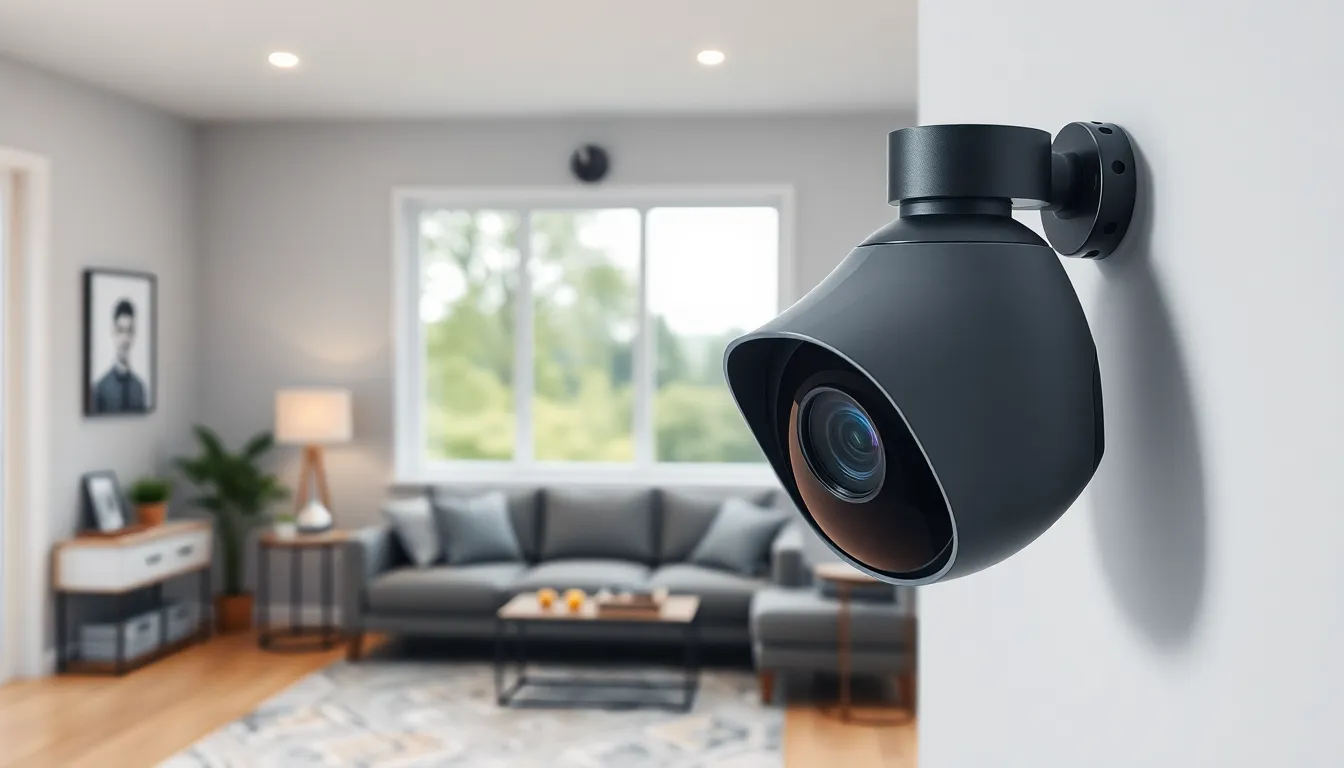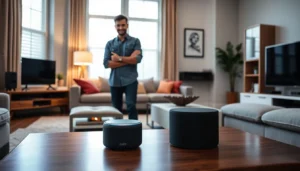Table of Contents
ToggleIn a world where even the squirrels seem to have a master plan, keeping an eye on your home has never been more crucial. Enter home security cameras—your trusty sidekicks in the battle against unwanted visitors and the occasional raccoon raid. These high-tech gadgets aren’t just for the tech-savvy; they’re for anyone who values peace of mind and a good night’s sleep.
Imagine sipping your morning coffee while monitoring your home from afar, all without breaking a sweat. With the right security camera, you can deter intruders, keep an eye on the kids, and even catch that sneaky neighbor borrowing your lawnmower. So, if you’re ready to transform your home into a fortress, let’s dive into the world of home security cameras and find the perfect fit for your needs.
Overview of Home Security Cameras
Home security cameras enhance residential safety by providing surveillance and peace of mind. They monitor various environments, including indoors and outdoors, allowing for comprehensive coverage. Many homeowners rely on these devices to deter potential intruders and capture activities around their property.
Types of home security cameras include wired, wireless, indoor, and outdoor models. Wired cameras often provide steady connections and power supply, while wireless options offer flexibility in placement. Indoor cameras help keep an eye on family members and pets, whereas outdoor cameras withstand various weather conditions.
Resolution and field of view are critical factors for selecting a camera. High-resolution cameras ensure clear images, facilitating identification of individuals and activities. Wider fields of view capture more area, reducing the number of cameras required for comprehensive coverage.
Smart features elevate the functionality of security cameras. Motion detection alerts notify homeowners of unusual activity, while two-way audio allows communication with visitors or intruders. Cloud storage options enable remote access to recorded footage, enhancing usability and convenience.
Many popular brands provide customizable home security camera systems. Notable brands include Ring, Arlo, and Nest. Each brand offers distinct features, catering to diverse security needs and preferences.
Installation processes vary based on camera type and brand. Some cameras provide simple DIY setups, while others may require professional installation for optimal performance. Choosing the right installation method depends on technical skills and personal comfort level with technology.
Types of Home Security Cameras

Various types of home security cameras offer unique benefits for homeowners. Understanding these options can help in selecting the right solution.
Indoor Cameras
Indoor cameras provide effective monitoring of activities within the home. They come in various designs, including dome, bullet, and pan-tilt models. These devices often include features like night vision, two-way audio, and motion detection. Some cameras integrate seamlessly with smart home systems, allowing users to monitor live feeds remotely. Popular choices include brands like Nest and Wyze, known for their user-friendly interfaces. Maintaining privacy while monitoring indoor spaces remains critical; thus, placement should consider this aspect.
Outdoor Cameras
Outdoor cameras are specifically designed to withstand various weather conditions. These devices typically feature robust housing, enhanced resolution, and wide-angle lenses for broader coverage. Many outdoor cameras include motion-activated alerts and night vision capabilities, ensuring effective surveillance even in low light. High-definition imaging helps capture clear footage, which is vital for identifying potential intruders. Major brands such as Ring and Arlo stand out for their reliable outdoor security solutions. Strategic placement around entry points maximizes their effectiveness in deterring crime.
Wireless vs. Wired Cameras
Wireless cameras offer flexibility in installation without the constraints of wiring. They connect to Wi-Fi networks, allowing for remote monitoring through mobile devices. Installation processes are simpler, making them ideal for renters or those seeking a DIY solution. Wired cameras, on the other hand, provide a constant power source and tend to have better video quality. These systems may require professional installation, making them less convenient for some users. Ultimately, the choice between wireless and wired cameras depends on the user’s preferences, property setup, and specific surveillance needs.
Key Features to Consider
Selecting the right home security camera involves evaluating essential features tailored to individual needs. Here are crucial aspects to keep in mind.
Video Quality
Video quality significantly impacts surveillance effectiveness. High-definition (HD) resolution of at least 1080p provides clear images, helping identify faces and license plates. Cameras with a wide dynamic range capture details in varying light conditions, enhancing overall visibility. Incorporating features like digital zoom also aids in focusing on specific areas, ensuring detailed monitoring. Clients often prefer cameras with quality ratings that allow for optimal surveillance around the clock.
Night Vision
Night vision capabilities enhance security even in low-light conditions. Infrared technology typically allows cameras to capture clear footage in complete darkness by illuminating objects within a certain range. Some models offer color night vision, providing better detail than traditional black-and-white images. Additionally, a range of 30 to 50 feet is common for effective nighttime monitoring, ensuring comprehensive visibility outdoors. Users often find these features invaluable for safeguarding properties after sunset.
Storage Options
Storage options influence how users manage recorded footage. Cloud storage provides remote access, useful for retrieving videos from anywhere at any time. Local storage solutions, such as microSD cards, typically grant users more control over their data without subscription fees. Depending on preferences, options range from storing several days’ worth of recordings to months. Users should weigh factors like storage limits and access speeds to ensure their surveillance footage remains accessible and manageable.
Benefits of Using Home Security Cameras
Home security cameras provide significant advantages for homeowners, enhancing safety and peace of mind. Various benefits make them vital assets for protecting residential properties.
Crime Deterrence
Crime deterrence remains a primary benefit of home security cameras. Intruders often avoid homes with visible security systems, reducing the likelihood of break-ins. Statistics show that neighborhoods with cameras experience up to 50% fewer crimes compared to those without. Cameras not only capture footage of suspicious activity but also serve as effective visual warnings against potential threats. Visible security measures, such as outdoor cameras, boost homeowners’ confidence while discouraging criminal behavior in the area.
Monitoring Remote Areas
Monitoring remote areas becomes more accessible with the installation of security cameras. Homeowners can keep an eye on points of entry, garages, and yards from anywhere using smartphone apps. Many systems offer real-time alerts and video feeds, allowing immediate response to any unusual activities. This capability proves invaluable for properties situated in isolated locations or those with significant ground to cover. Remote monitoring helps homeowners maintain a safe environment and ensures quick action when needed.
Insurance Benefits
Insurance benefits can be a considerable advantage of home security cameras. Many insurance providers offer discounts on premiums for homes equipped with verified security systems. Investing in cameras often leads to lower overall costs for homeowners, as insurers acknowledge the reduced risk of theft and property damage. Additionally, recorded footage can serve as crucial evidence in case of incidents, streamlining the claims process. Overall, installing home security cameras not only enhances safety but also provides financial incentives through insurance savings.
Investing in home security cameras is a proactive step toward safeguarding one’s property and loved ones. These devices not only enhance security but also provide peace of mind through constant monitoring. With various options available homeowners can choose the right type of camera that fits their specific needs and preferences.
The benefits of having a security camera system extend beyond deterrence. They offer valuable insights into daily activities and can even lead to financial savings on insurance premiums. By selecting high-quality cameras equipped with smart features homeowners can ensure comprehensive protection for their homes. Ultimately the right security camera system acts as a reliable partner in maintaining safety and security in an ever-changing world.




